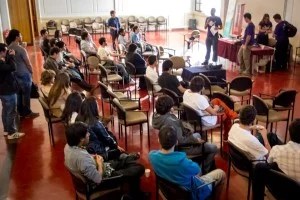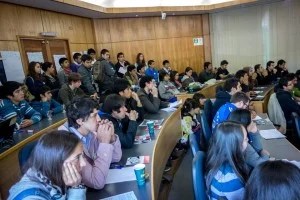May 2013
(Based on a report to CORFO)
“You can cut all the flowers but you cannot keep spring from coming.”
– Pablo Neruda
“We are guilty of many errors and many faults but our worst crime is abandoning the children, neglecting the fountain of life. Many of the things we need can wait. The child cannot. Now is the time his senses are developed and when he should play. To him we cannot answer ‘Tomorrow.’ His name is ‘Today.’ For a child who does not play is not a child, but the man who doesn’t play has lost forever the child who lived in him and who he will miss terribly.”
– Gabriela Mistral
As part of Startup Chile, you have to complete something called RVA Points. It’s the programs way of making the startups give back to Chile and is expected to take about a third of your time.
“RVA alliances seek to both motivate entrepreneurship in Chile and to connect companies, universities, organisations or Chilean entrepreneurs with startups in a way that causes positive impact to the Chilean ecosystem.”
So we thought we’d try something a bit different. Most companies treat RVA points like a chore but this was our way of going out with a bang and making something lasting. A project we called Startup On Wheels created by Anna Sitnikova, Sergio Calleja and Ricardo Campos. The required RVA points we’re supposed to earn is about 4,000 but we worked out over the trip we would have earned a lot more, I think probably closer to 20,000.
It’s a pretty crazy idea. Put 10 entrepreneurs from around the world onto a bus and send them on a 2500 km road trip across Chile visiting a lot of universities and high schools along the way. Speaking to dozens of entrepreneurs and investors, speaking to thousands of students while conducting hundreds of interviews and mentoring hundreds of kids. Everything from running competitions to lectures in halls, workshops in small classrooms, one on one interviews to group discussions and panels with industry leaders.
What makes you feel important?
All condensed into a 2 week trip while seeing the beautiful Chilean countryside. By the end of the trip I think we would have spoken to over 3500 people across metropolitan and rural Chile. Young people. Old people. Students, entrepreneurs, academics and investors. From metropolitan cities to rural places that few speakers visit. I was the first Australian a lot of these people had ever met.
The wealth of experience was actually quite profound. Timofey and Anna were from Russia. Andrew from Ukraine, Patrik is Swedish, Andres and Ricardo were Columbian, Tomaz and Roberto are Argentinian, Semiha and Hassan from Israel, Azherbaijan and Turkey; Sergio is a born and bred Chilean Doctor, Darren, Jonathan and Ian are from USA, Pravin from India and New Zealand; Lena and Stephan from Germany.
Everyone has such diverse experiences from so many different backgrounds. From people who’d built apps used by millions of people to building wind turbines for VC backed companies. A guy who specialises in getting medical devices approved by the FDA, a few lecturers at top notch universities, a handful of small exits between us and collectively mentions in nearly every major international media outlet.
The sponsors too were amazing. We were sponsored by Microsoft who gave us Xbox’s to give out in schools as prizes, Dilmah for coffees and teas, Guylian chocolates to make the trip fun and Corona for everything else.. They were all very popular.
Where do you see yourself in 10 years?
We experienced first hand a snapshot of Chile and the problems they face. On the ground, without any politics and organised a report on the findings and how one might go about overcoming them.
There is a pervasive risk-averse cultural bias. People who start companies in Chile are seen as being greedy and de-valued as a result. It is seen as misallocating value from the more important parts of life such as family. Failure is also very seriously punished usually by social exclusion. A failed venture can mean a lot more than just a bad experiment, it is seen as a sign of incompetence on the part of the founder. It’s backward in its thinking but is very common.
To see how it developed I think we need to go back in time.
What does success mean to you?
As little as 20 years ago Chile was run by a dictator Augusto Pinochet, a military commander who forcibly took control of the government in a US supported coup d’etat. This was 1973 and the dictatorship governed Chile until 1990. Before that the country was communist. Treating this government change as an economic reset which it was. Effectively Chile as a country is only 20 years old.
I’m not going to get into details but suffice to say the coup d’etat was very unpleasant. Whilst unpopular and having broken every international human rights law, the Pinochet regime created a huge amount of economic growth. They were the driving force behind the infrastructure and economic boom Chile is experiencing.
A previously communist government headed by Salvadore Allende had expropriated most of Chiles industries. This nationalisation inadvertently created a very slow decline in its economy and standards of living. At the fall of their reign the country opened up to Western corporations which aggressively flooded the market. Coca Cola, DOW, Mcdonalds, WalMart suddenly appeared crushing the fledgling Chilean brands who up till this point were owned by the state.
This indirectly conditioned the Chilean consumer to value non-Chilean products and services higher than their home grown variant. So in a sad way, Chileans are ashamed of everything Chilean. Add to that the few and far between Chilean successes that emerge and as a result successful Chileans aren’t really embraced.
After the collapse due to the coup d’etat and the industrialisation of Chile, as so often happens, a select number of well connected families benefited most. This generationally built on top of itself and the end result being there are a small number, roughly 15 super wealthy families who essentially own all of Chiles major modern day corporations.
Corporate activity is essentially just the 15 families buying and selling companies back and forth between them. So nearly everyone in Chile works for the government, a company owned by one of the families or a big foreign corporation which is why there isn’t much of an active Latin American stock market since few companies are founded and eventually IPO.
Because there isn’t an active stock market it removes one route to liquidity which is why foreign investors haven’t up till now seen Chile as a good place to invest.
What do young people here think about?
This is partially why Startup Chile is such a groundbreaking program. Because it serves 3 very important agendas at the same time.
It institutes endemic cultural change to see entrepreneurship as a viable alternative. It creates over 900 new companies from some of the best founders from other countries, in a way marketing and making Chile famous in the startup and venture hubs around the world. The increased attention on the world scale spurs local investors to reinvest in their own country and foreign investors to take notice of Chile.
Chile suddenly became a worldwide household name.
I remember once I was asked to list countries that don’t have an A in them. After a long time, I couldn’t really think of many. Now I can, Chile. That right there says a lot about how well known Chile has become in the world.
The beautiful part of the program is because they have a portfolio approach, all they need is one juggernaut success to stay in Chile and they will have recouped the entire cost of the program in corporate taxes. Not including the boost to the local economy and culture in the form of thousands of entrepreneurs flying in from around the world.
So if they get a juggernaut, which it should since they are investing in nearly 900 companies, they will get all of the other benefits basically for free.
It makes it one of the craziest most exciting programs ever thought of and the first one of its kind. If it works it will set quite an important precedence which I think a lot of countries will end up following.
What does happiness mean to you?
However having gone through it, Startup Chile is not for everyone. It’s a very different instance of the conventional investment fund. One suited more for a certain type of startup.
If you’ve never been to Latin America before or plan on launching in Latin America then it’s for you. But the language barrier is very hard to get over. The $40k in financing, while equity-free doesn’t exactly come without strings. The process of getting it is excessively bureaucratic and takes a long time but that’s expected since it comes from the government. We landed in January and wasn’t until April did we receive the first round of funds.
There won’t be much in the way of mentoring or investors and you’re left to your own for most of the time. I think the worst thing Startup Chile does is micro-manage and force companies to spend all the money over the course of the program on things they approve of.
Those kind of judgement calls can be a huge time waste, especially since they are made by bureaucrats not entrepreneurs. When we applied for our first reimbursement, we were 90% rejected as most of our expenses were deemed unnecessary. Only after a lot of heartache did we finally get the amount we were supposed to.
I think in the aggregate the companies would do much much better if they were just given $40k and then left alone. So the program is optimally suited for early stage startups who would benefit most from 6 months of solid engineering, $40k in financing and want to launch in South America.
What motivates you? – What makes you exited?
I didn’t realise it in Santiago because we live in an esoteric bubble. But Startup on Wheels is the first time anyone from Startup Chile had really done a large scale trip to other provinces in Chile. The demand was incredible. Like what I imagine Los Altos is to Palo Alto in Silicon Valley. Everyone is just dying for this to happen.
We met with so many Chilean investors. This happened so frequently it depressed me, we would meet someone who called themself an investor. Then I would ask how many investments they’d made in the last 12 months? The answer was always none. So I would say, well then you’re not an investor. You’re just someone with money. It’s incredibly satisfying because Chilean investors are used to being worshipped.
None of them are used to being called on their mistakes or told how wrong they are or why they are actually creating negative value. It’s a system shock. Then they take the feedback and change ever so slightly. Which is the best feeling of all time. Because we’re actually making a difference. We’re influential. It’s like a group of people who wanted to change for the better but just didn’t know how to.
What are the biggest problems in your community? What don’t you like?
Everybody has their own favourite parts of the trip but mine was a panel in Temuco and a high school in Pucon.
The high school was full of pretty girls with an interest in technology who seemed to really like what I was talking about. I think some of them may have had a crush on me. The best moment was when a girl was speaking loudly to her friends in Spanish about how handsome she thought I was and the whole room heard her and started murmuring. Massive self esteem boost.
A group of girls even wanted to move to and visit me in Australia then started making threats saying I’d have to pick one of them to me my girlfriend or they’d all drop out of my class. But afterwards they actually took everything they’d learnt and started their own projects to implement their ideas. A lot of them even started learning how to code.
The second was a panel in Temuco with senior lecturers, academics, local businessmen, executives and entrepreneurs. It was supposed to go for 1 hour. It ended up going for 4. We were talking about how to build Temuco into an innovation hub second to Santiago. There is a lot of money in Temuco but it’s under-deployed.
I talked about how Australia is going about creating an innovation ecosphere and afterwards the dean came up to us and was like, because of us and that talk they are now going to start an accelerator at the university. To brute force more funding and more startups to happen.
The event in Concepcion had like 400 people coming. All students from universities and high schools. A university event had 200 students from one course. The high school one had 150. Some of the smaller talks in classes only had like 20 to 30. But if the demand is any indication, Chile is really starved for this kind of stuff.
One of the most memorable moments was a common answer that would come up during interviews. A girl told me that this was the first time she’d felt like anyone had ever asked her what she thought. The first time she’d felt like CORFO or the government actually cared about what the young people thought. That since their voice wasn’t heard often that it was just easier not to speak. A lot of people echoed similar views.
They would talk about how they felt about Chile and the people. What they worried about and dreamt and what they wanted to do with their lives. It was quite beautiful.
A common trend was they valued family and education above everything else. A lot of the people interviewed wanted to leave Chile and they saw a good education as a way of doing it. They worried that with the future of Chile being bright and going through an economic boon, what would happen to the people who couldn’t keep up.
A common trend was they felt Chileans were very puppet like in that they’re easily succeptible to influennce and peer pressure. That their people are lazy, selfish and only think about themselves. They felt like most of the problems weren’t addressed or kept hidden. And that they wished it wasn’t the case that the only way to get anything done in Chile was to be friends with or know someone important.
A common trend when asked the best way to fix things was to instead of someone making a decision for everybody that they should be asked what is best. Because if you get the thoughts of many, it gets a complete picture. Another trend was that they were tired of important things only being known by important people. That everyone should know about the important topics effecting their nation.
If you were in charge, how would you fix them? What needs to change?
It also has something to do with age. Chile is a very conservative top down country. Top down in the literal sense, old people and family legacies control everything and is the cultural norm. Because no-one has seen or is used to seeing successful and ambitious young people, they don’t intrinsically believe it’s even possible.
In a kind of reductio ad absurdum proof through contradiction kind of way just exposing Chilean youth to seemingly capable young people is inspiring. Whenever people would hear how young I am, they’d lose their mind. Whole rooms would turn to each other and are like whoah, he’s so young, he’s actually younger than all of us. If he can do it, why can’t we?
I think out of the trip hundreds of companies would be started as a direct result.
It’s like everyone is on the edge of a cliff but they just need that external validation that is 12 renegade entrepreneurs from around the world to say that it’s ok to start something. Like a gentle push off the edge. Nobody knows what entrepreneurship is. Few people even know what a startup is or what starting your own company means.
If you worked forwards from first principles. If a lot of the young people don’t know what a startup or even the idea of starting a company is, then the notion of a startup can’t be ubiquitous if the concept behind it isn’t ubiquitous. If the concept behind it isn’t ubiquitous it won’t be culturally accepted.
For example during a talk at a high school one of the girls came up to me and was like, “I was going to start a business which I had an idea for but then I didn’t because I was afraid what my family would think of me.” So I sat down with her and her friends and showed her how and explained really simply how to “start a startup”. Then even did it for her and was like, you can do this tonight if you wanted. She gave me the biggest hug afterwards.
I was mostly doing interviews with groups of people and one on one mentoring. The classes I was teaching were the mental models and how to think about development and history. I was explaining the history of how startups happen and what a startup even is. And how they developed and why it’s ok to do one. I probably wasn’t very good which was fine since we had Ian and Stephan on the trip lecturing as well. Ian is a lecturer at Stanford and Stephan lectures at the Universidad de Chile, Humbold University in Berline and a number of fancy universities around the world in so very knowledgeable guys.
What stops you from doing the things you want to?
I don’t know how to describe it but it felt like we were parents talking to a kid in a dark room who’s scared of the dark. And I’m just explaining, it’s only the dark. There’s nothing to be scared off. And you say it with a smile and they believe you and it’s like the best feeling. Because we’re teaching all these people that the dark isn’t something bad. It’s not something to be scared off.
Which is what I think people mean when they talk about teaching coding in schools. They’re trying to teach that feeling that you can actually just build anything you can imagine. Like in art schools it’s the first thing that you learn, that if you can imagine something you can make it. This would be the technology equivalent. A company is just the manifestation of an idea.
I felt like a rockstar again. But a different type of rockstar, like a teacher rockstar. Like when you explain something complex and people suddenly get it and that gleam in their eyes when they feel like they’ve understood something profound. I feel like this is the feeling that causes people to go and become teachers.










































